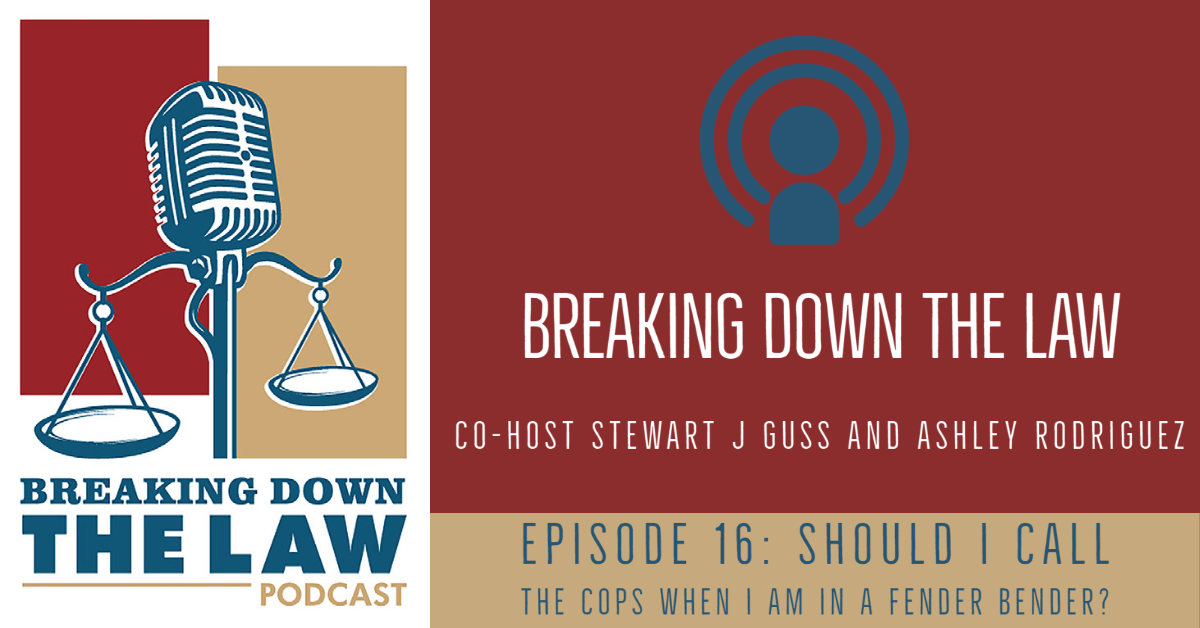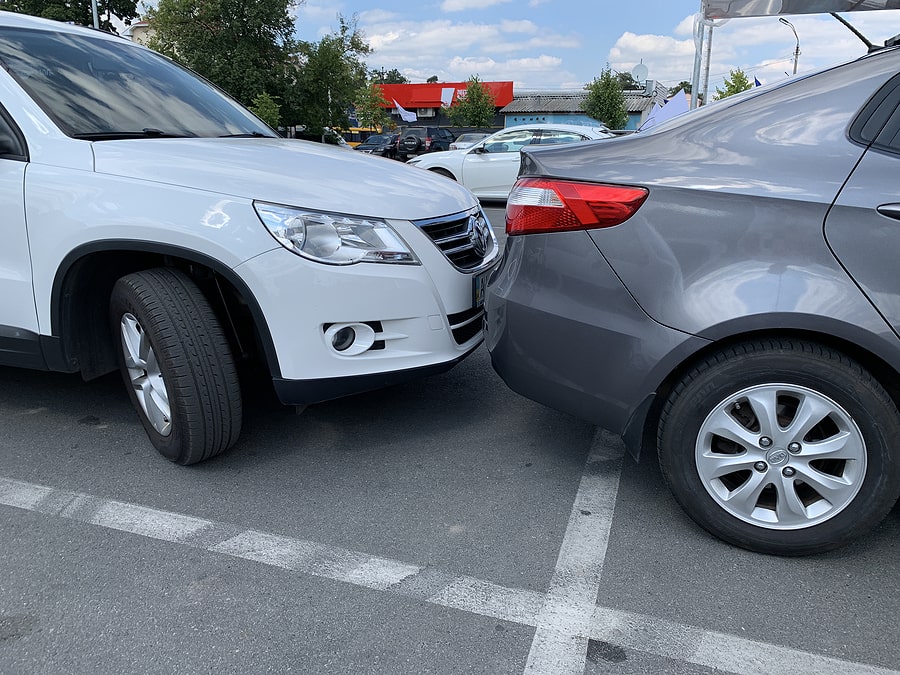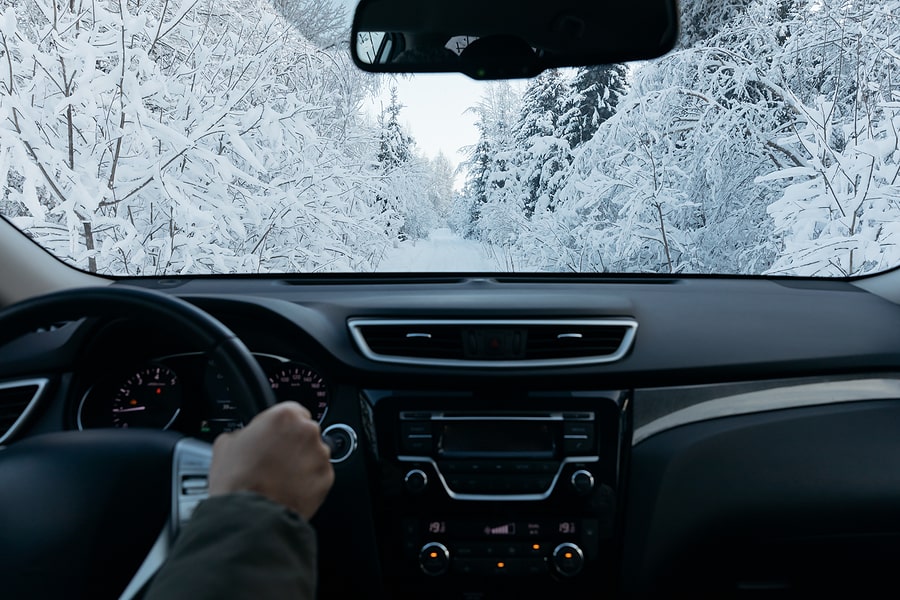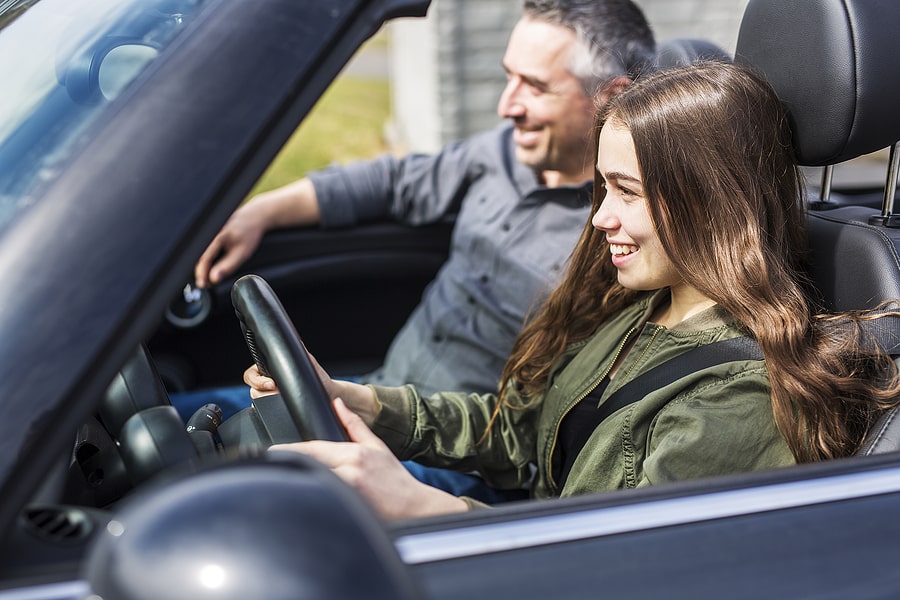For our inaugural episode of the Breaking Down The Law Podcast we’re joined by Donald Garcia , a personal injury lawyer in Los Angeles, California. Who has over 20 years of experience. He is joined by Breaking Down The Law Podcast host, Ashley Rodriguez.
During today’s episode we’ll be asking Donald all about fender benders. Having worked for insurance companies for several years, after graduation from law school, Donald dedicated his career to pursuing the rights of those who suffered personal injuries at the hand of another.
- There is no definition of a fender bender. You have no idea how bad the damage of your car or truck is because you can not see everything that a mechanic would see.
- You might think you feel okay but you are not a doctor. When you call the police to get them there it’s okay to say you don’t know and get the police to the scene of the accident and get checked out.
- Then follow the exact procedures of an accident. Make sure you take photos and videos. Learn more about the exact procedures to take after an accident.
- If the police do not come for any reason and you don’t get a police report, make sure you go and file a counter report that you were in a car accident
- Witnesses are important. If you think someone is a witness make sure you ask them if they saw anything? If they did see the accident make sure you get their name, number, DL.
Stay tuned for the next installment of the Breaking Down The Law Podcast with Stewart J Guss and Ashley Rodriguez!
Contact Us: 281-783-3934 or [email protected]
If you want to subscribe to our podcasts on your favorite podcasts player click here for all the links to each one!
Transcript [This transcript was created using an automated transcription service and may contain errors]
Intro: breaking down the lawa podcast hosted by attorneys and legal specialists discussing everyday law and how it affects regular people, regular people. Let’s break down the law with our host, Stewart Guss and Ashley Rodriguez. They have the inside scoop on everything legal and newsworthy.
Ashley Rodriguez: Welcome to breaking down the law. This is Ashley and we have a special guest with us today. Don Garcia. How are you?
Donald Garcia: I’m fine. Hi, my name is Don Garcia and I work for the law firm store. Check us.
Ashley Rodriguez: Awesome. Okay, so today we’re going to talk about fender benders. And should you call the cops? So Donald’s what should someone do if they’re in a minor accident?
Donald Garcia: Well, there is no legal definition of a fender bender. So given the the make of style, the current cars, what might appear to be minor damage might end up being substantial property damage bill. So you should always, always if you can call the police let them know that you’ve been involved in an accident.
Ashley Rodriguez: That makes sense, because you don’t really know what’s going on underneath. No, you have no idea. So I definitely need to report the fender bender is that the first thing you would say that I would do?
Donald Garcia: Well, the first thing you want to do is you want to evaluate yourself and make sure that you’re doing just fine. And if you can go ahead and make a phone call to police, you have no idea at that moment, whether you’re injured or not. It’s one thing that I hear often people will say, you know, I tell the police I’m not injured as a result, they don’t come to the accident. So I take report, you don’t have to tell them you’re not you’re not a doctor, at that moment, you would be a patient. So it’s perfectly fine to say I’m not feeling right. Whatever it takes to get them to come because you want the police to arrive and make that police report. Assuming for whatever reason they don’t. But I would do is make sure that if I use my phone, let me use my camera portion of my phone, I would utilize that to take photos of the property damage, both to the vehicle you’re in as well as the vehicle, the other drivers vehicle. By then I would make sure I’d ask them. What is their name? What’s their address? What’s their insurance company name, and the policy number of their insurance company? Those things you must do?
Ashley Rodriguez: So then go ahead and like get a photo of their policy ID card. driver’s license.
Donald Garcia: Yeah, I mean, that’s, that’s a quicker way of doing it. Absolutely. And you don’t have to worry so much about them getting something wrong. They’ve got a copy of their insurance information, their deck page, whatever it might be with their ID card, please go take a photo of that. And definitely get one of their driver’s license. And anything else, you’re never gonna go wrong if you have too many photos.
Ashley Rodriguez: What about videos, and I think a video of like the damage,
Donald Garcia: You can take a video If you think you can do that faster. But just make sure you get the license plate number, as well as the property damage. It shouldn’t take long. If we’re going to do a video. I wouldn’t want the individual to try to prove who caused the accident. who’s at fault. Who’s the right way with a video?
Ashley Rodriguez: Got it, so if I don’t feel injured, do you think I should go ahead and get checked out? Like if the police don’t come?
Donald Garcia: Absolutely, because you don’t know what the future is going to be. There’s been countless times where individuals say, you know what, the accident scene, I didn’t really feel anything. But I woke up the next day or the day after. And I had all these complaints. So in the fact that you don’t know what the future will bring. Painted often arrive A few days after the accident. It’s better to go ahead and have yourself checked.
Ashley Rodriguez: Cuz you know, those endorphins and everything, and you’re just in shock. So you might not really be even feeling the pain till later
Donald Garcia: absolutely Better safe than sorry, just have yourself checked out.
Ashley Rodriguez: And so is that all that you think we should do if the police are called and they don’t come at the accident site, like photos, and then
Donald Garcia: if they will come to the site, you can do the like I said, make sure that you at least get the other party’s insurance information, the policy number, their name, their address, all that information you can get from their driver’s license. And if they have any identification card with the insurance company, make sure you get that. One thing I would tell them not to do is don’t say anything that might incriminate yourself. So many people do that. They want to be nice if you’re just involved in a car accident. Don’t say anything. thing Do we have somebody else tend to believe? Well, they must have caused the accident. So don’t give that if the police will not arrive. What you need to do then is within days after the accident, go to the police station, the accident happened and file what’s called a counter report. And that just lets me know that yes, you were involved in accident. I mean, here’s the thing that took the time to go down there and do that. I would look at that favorably. And chances are, you’re probably going to be as honest as you possibly can be.
Ashley Rodriguez: Okay. Okay. So definitely, if you don’t have a police report file under those counter reports.
Donald Garcia: if you can, absolutely. What’s happened currently, and having been an adjuster myself, Well, over 25 years ago, the insurance carrier is always going to believe the version that their insurance tell them unless there’s a police report that says otherwise, or there’s a witness, but account report may have some sway. And I’d rather take that one extra step. If I didn’t have a police report, I didn’t have a witness. I don’t think it hurts to go down and make a counter report.
Ashley Rodriguez: So let’s say there are witnesses, what should I do? Before I leave, like I see people saw a
Donald Garcia: number of the witnesses, again, you can utilize the same procedure, you can get a video of their license, driver’s license, and they get a phone number from them. Okay, so they can be contacted.
Ashley Rodriguez: So I need to ask them like, Hey, are you willing? Did you see in or just that they were there? Like, how do I confirm that they were actually witness? And
Donald Garcia: you can ask them something along the lines? Did you see how the accident occurred? If they say yes, then we would say would be willing to be a witness of mine. Again, it’s very non confrontational, I would think they would say yes. Can I ask you just to provide me with information, such as, can I look at your driver’s license, just so I can take a quick video, or a quick snapshot, show where you live? And date I get a phone number? That’s it.
Ashley Rodriguez: So I should always make sure that I should ask for the other party’s insurance information.
Donald Garcia: Always.
Ashley Rodriguez: What happens is they don’t have insurance?
Donald Garcia: Well, heres the thing we have to believe them. Some people will say they don’t have insurance, when in fact they do. So what we then do is we contact the DMV, and we file a particular paperwork, and we’ll determine whether or not the party was insured. But you need the license plate number.
Ashley Rodriguez: Okay, so I see a claim for sure. Because, yeah, I never even thought about that. Someone would say they didn’t have it at that point, a lie about that.
Donald Garcia: Imagine that. Yeah. People just don’t tell the truth. And it happens more often than that I can say, but it happens more often than not, is somebody will say you know nothing about the accident. And then they’ll go home, they’ll talk to family, they’ll talk to friends, the next day, it’ll be your fault. That happens at least five times out of 10. It’s amazing. That’s why we try to get as much as you can. And again, you can’t prove your case that very day. But if the police arrive, that’ll certainly help.
Ashley Rodriguez: Yeah, so the main things, just get as much evidence as you can, as many witnesses, anything you can so that way you have that to use for later.
Donald Garcia: Correct.
Ashley Rodriguez: That’s it. So then what would be the next step?
Donald Garcia: Well, after you’ve gone and had some medical evaluation, I wouldn’t be able to contact contact our law office and get an attorney involved on your side. The sooner the better. So I think, given date, all the advice that I’ve just given, an attorney would give you the same advice, but immediately following an accident.
Ashley Rodriguez: All right, Donald. So is there anything else that you would tell people about fender benders and minor accidents? Where does we think we covered it all?
Donald Garcia: I think we’ve covered it all. Again, I stress in the bill, I said at the very beginning, there’s just no legal definition of a fender bender, and you just don’t know what’s going to happen. So rather than wait until you’re behind the eight ball, just get out in front of it first and be proactive and giving all the documentation and the evidence that you can immediately following the accident. But sometimes it’s hard to do it unless you’re skilled at being in accidents. These things sometimes just leave your mind as to what to do. I mean, like you said earlier, your endorphins are running wild and you’re upset. There’s all kinds of things. So if you can just remember the simple things of trying to get the other party’s information and get photos of the vehicles that were involved. Those things will help.
Ashley Rodriguez: Yes, because if you said we could think it’s just minor but then we could have some frame damage and they could total our car and then what?
Donald Garcia: That’s right, then what do you think the other side And then all of a sudden, you’ve got to rely on your insurance company. And let’s hope you carry uninsured motorist coverage. So
Ashley Rodriguez: let’s get anything we tell everyone, you got to have that as
Donald Garcia: well. Not only do you have to have uninsured loss, and I know this is outside, but we were talking about, but always strive to make sure they have new m slash UIM, because it’s very common for somebody to be hit by another person do not have enough coverage. So if you don’t have UIM, then which is underinsured motorist coverage, and you you may be a creek. So I’ll give you a perfect example. For instance, in California, a minimal policy is 15/30, which means 15,000 per person, or 30,000, per instance. But it only covers up to 15,000 for one person. So if you have just one person that vehicle, and you get involved with somebody who has a minimal policy like that, they’re only going to cover you up to 15,000 unless you have under insured motorist coverage. And let’s say that you have a 100/300 policy, which means you have uninsured motorist slash underinsured motorist coverage of 100 to 300. In California, you don’t have to stack but you get the difference between your coverage and the person who hits you. So in this case, if you have 100/300, they have 1530, you get the difference between your 100 and 15 you’d have an additional $85,000, but the beverage for a total of $100,000 worth of coverage. So to me, it’s almost
Ashley Rodriguez: Yeah, because you don’t know what could happen.
Donald Garcia: You don’t know what could happen. And I mean, the way I always look at it, the chances of you being hit by somebody who’s either uninsured or underinsured are pretty high.
Ashley Rodriguez: Yeah, cuz most people just go with what’s cheap out there because they really don’t
Donald Garcia: Right? So even in the state of Texas, where you have 30/60 $30,000, it doesn’ take long to go to $30,000. S if I had 100/300 in Texas there’s stacking allowed there I now have the 100 on top of th 30. I now have 130,000 wort of coverag
Ashley Rodriguez: Yeah, exactly. So you’ve taken like, I mean, most cars are over 30 grand in value, right?
Donald Garcia: Put in it’s it’s a thing, it’s not so much the property damage, because this really only covers your bodily injury. But I’ll say this, go to the hospital one day.
Ashley Rodriguez: If you get sick, maybe once right, that’s $30,000
Donald Garcia: you’d be amazed how quickly you can shoot for that 30,000 so it pays to get the additional coverage.
Ashley Rodriguez: All right, well, you’ve heard it today. Thank you Donald
Donald Garcia: You’re very welcome.
Ashley Rodriguez: And if you’re in an accident and you’ve got all the information and you need help, please call Stewart J Guss at 281-783-3934. Thank you





